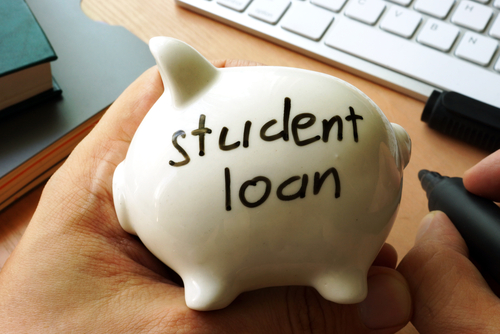Student loan repayments can be overwhelming, especially when the monthly payment looks more like a mortgage payment. Many people who are graduating from school are finding themselves with huge student loans, and in jobs that do not offer enough income to meet their necessities and also cover the monthly student loan payments. Although there are several programs available to assist with the repayment of federal student loans, many private student loans have been unwilling to provide affordable payment plans. Federal student loans offer the Income Based Repayment program which is intended to decrease your monthly payment to an affordable rate based on your income and household size. Private student loans do not qualify for the Income Based Repayment program. Even under some of these programs the proposed payment amount may be beyond what is affordable to a person.
What relief is available if you cannot manage your student loan payments and you are being threatened with garnishment? One option is to seek relief under the bankruptcy code. Although many individuals many not qualify to have their student loans discharged as part of a bankruptcy, they can still use bankruptcy to repay their student loans with an affordable payment.
Chapter 13 bankruptcy allows individuals with student loans to consolidate their student loans into an affordable payment plan that is made over 36 to 60 months. This can be a great incentive to someone who is facing a garnishment from student loans and the creditor is unwilling to work out an affordable monthly payment. Once the Chapter 13 plan is filed, any garnishment or collection efforts from the student loans must cease. As part of the Chapter 13 plan, a payment is proposed that offers to pay all of your unsecured creditors (including student loans) all of your disposable income. The offered payment can be significantly lower than what is required from the student loan company.
You can still file for Chapter 13 bankruptcy to repay your student loans, even if you have recently filed a Chapter 7 bankruptcy and received a discharge of your other debts. The Chapter 13 bankruptcy can simply be used to set up a reasonable repayment amount for your student loans.
Once you complete your Chapter 13 repayment plan, any remaining balance that is unpaid on your student loan will still be your responsibility. If after completing your Chapter 13 plan, your circumstances have not changed enough to allow you to repay the required amount on the student loans, then you may need to consider filing another Chapter 13 bankruptcy.
If used properly Chapter 13 can be a powerful tool to pay your student loans. To determine whether Chapter 13 bankruptcy can help you lower your monthly payments, have your budget reviewed by a local bankruptcy attorney. An experienced lawyer should be able to give an estimated payment amount for your Chapter 13 plan at the initial consultation.

